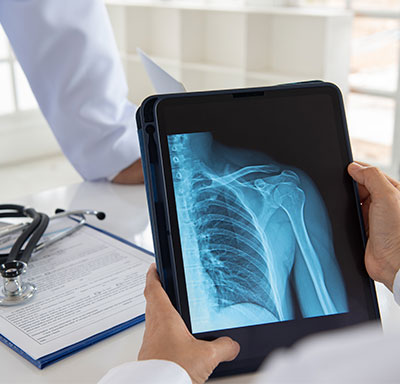Benefits of Testosterone for Your Bones
Low testosterone has been linked to an increased risk of osteoporosis in men.
Science has long known that testosterone plays a major role in bone density. As men age, bone density drops, bones become fragile, and this puts older men at risk of osteoporosis and osteoporosis-related fractures. We now know that much of the loss in bone mineral density in men over 50 is largely related to the drop in testosterone levels that occurs as men age.
Doctors know that a man’s testosterone level peaks at around the age of 20. After that, it starts a slow but steady decline. By the time a man reaches the age of 40, he can expect his testosterone levels to drop at a rate of about 2% per year. This age-related testosterone decline can lead to several health issues, not the least of which is decreased bone density.
The good news is that current research also shows that testosterone replacement therapy can prevent and, in some cases, even reverse age-related bone loss.
Several clinical trials on the positive benefits of testosterone on bone density found that testosterone replacement is quite effective in increasing spinal and hip bone density.
Positive Influence of Testosterone on Your Bones
Studies have shown that testosterone has a positive influence on bone health and the structural integrity of the human body. Men with low testosterone have an increased risk of developing osteoporosis. In women, estrogen plays a vital role in bone health and regeneration. In men, it is testosterone.
The testosterone hormone itself does not directly build and maintain bones in men. In the male body, a small amount of testosterone is converted into estradiol, which is what actually maintains bone mass and strength in men — not testosterone. However, as men lose testosterone as they age, there is not enough available to convert to estradiol, and loss of bone density is the result.
Osteoporosis is a degenerative bone disease. Osteoporosis is more common in women, but it affects nearly 200 million people all around the world, both men and women. Osteoporosis is the cause for the weakening of bones that leads to fractures that are common among the elderly. Osteoporosis also makes these fractures difficult to heal, so osteoporosis fractures can be severely disabling to older people.
As men age, their bone density decreases. This is particularly significant in men over the age of 65. Such men can develop osteoporosis as a result of low testosterone levels.
While osteoporosis is most commonly associated with postmenopausal women, men are also at risk. About 2 million men in the United States currently have osteoporosis – and most of these cases are linked to low testosterone levels.
Studies have shown that “Testosterone is an important hormone for both bone gain and maintenance in men. [Men with low testosterone] have accelerated bone turnover and increased fracture risk. In these men, administration of testosterone inhibits bone resorption and maintains bone mass.”
Basically, these studies are saying that if you have bone loss that is caused by low testosterone, then returning these testosterone levels to normal can improve bone density.
Studies have proven that testosterone therapy can strengthen bones and prevent fractures typical of osteoporosis.
Who Should Consider Taking HRT for Their Bones?
Testosterone replacement falls under the broader category of hormone replacement therapy or HRT. Anyone — male or female – who is concerned about bone loss and the risk of osteoporosis should consider HRT. Menopausal women, in particular, are at great risk of loss of bone density due to the critical role that estrogen plays in maintaining bone health.
We also know now that men too face an increased risk of osteoporosis due to declining testosterone levels. Men and women over the age of 45 also experience a loss of human growth hormone (HGH). HGH also plays a very significant role in bone strengths and density. Anyone over 45 is losing several hormones critical to bone health and should consider HRT to lower their risk of osteoporosis.
The greatest risk to people with osteoporosis is bone fractures. Fractures are common in people with osteoporosis because it usually occurs around the same time that people start to experience balance, weakness, and other issues that can cause falls. Fractures are also harder to heal in older people, making osteoporosis fractures particularly dangerous.
Is Testosterone Therapy Safe to Take for Osteoporosis?
Testosterone therapy is not given specifically to treat osteoporosis. However, we know that men that have low testosterone are at great risk of bone loss and osteoporosis-related fractures. If you have been diagnosed with low testosterone, testosterone replacement therapy is the safest and most effective way to return your testosterone levels to normal.
One of the many benefits of testosterone replacement for men with low testosterone is improved bone density and bone strength. Testosterone also helps you to build muscle. Muscle supports bone, and this is another way that testosterone therapy can lower your risk of bone fractures.
Is Testosterone Therapy Used to Treat Osteoporosis?
Clinical research has confirmed that age-related testosterone deficiency is one of the leading causes of osteoporosis in men. Studies have shown that as testosterone levels become critically low, significant bone mass can be lost over time. Eventually, this loss of bone mineral density weakens the strength of bones and makes them susceptible to fractures with minimal trauma.
We can make up for that bone loss with testosterone replacement therapy.
While testosterone replacement therapy is rarely used solely as a treatment for osteoporosis in men, testosterone therapy can inhibit further loss of bone mass in men otherwise diagnosed with low testosterone and prevent the development of very low bone mass, thus increasing fracture risk.
Men with low testosterone are at greater risk to develop osteoporosis.
Types of HRT for Osteoporosis Treatment
Both testosterone and human growth hormone (HGH) play a vital role in building and maintaining bone. Recent studies suggest that HRT involving HGH replacement may be even more vital to treating or preventing osteoporosis than testosterone replacement.
A landmark study published in 2015 in the Endocrine Society’s Journal of Clinical Endocrinology & Metabolism found that for many years after it was given, HGH continued to reduce the risk of fractures and helped maintain bone density in postmenopausal women who had osteoporosis.
Since then, a recent literature review and meta-analysis indicated that growth hormone replacement therapy reduces the risk for fracture in all patients with osteoporosis, men and women.
Most patients who have low testosterone are also experiencing age-related growth hormone deficiency and therefore can benefit from HRT that combines HGH and testosterone replacement. Such combined hormone replacement has many benefits beyond improving bone health.
What are the Possible Side Effects of HRT for Osteoporosis?
HRT for osteoporosis or to treat any of the symptoms of menopause in women, or age-related-testosterone loss in men, is generally regarded as safe. However, like any drug or medical procedure, HRT is not without risk. There are some potential side effects to HRT, but most of our patients using growth hormone therapy or testosterone therapy to treat osteoporosis experience few if any side effects. Any side effects you may experience from your HRT treatment can usually be mitigated by simply adjusting your dose of hormones.
What Do Studies Say About Hormone Replacement and Bone Health?
A recent study published in the Journal of Clinical Endocrinology & Metabolism proved that the HGH helps to reduce the risk of fractures and maintain the bone mass within healthy levels among postmenopausal women who have been diagnosed with osteoporosis. Furthermore, that study indicated the results of HGH treatment for osteoporosis were long-lasting, concluding, "A decade after the study began, the women who received the larger growth hormone dose still had higher bone mineral density levels than the participants who received the lower dose or the placebo.”
A 2014 study published in Menopause Review, looking at ways to minimize osteoporosis-related fractures in postmenopausal women, concluded, "Hormone replacement therapy (HRT) at different doses rapidly normalizes turnover, preserves bone mineral density (BMD) at all skeletal sites, leading to a significant, reduction in vertebral and non-vertebral fractures.”
Another study published in The Journal of Clinical Endocrinology & Metabolism, this one specifically looking at bone loss and testosterone treatment in men over 65, concluded, "Increasing the serum testosterone concentrations of men over 65 with testosterone levels in the mid-normal range for younger men did not increase bone density overall, but [TRT] did increase it in those men with low testosterone prior to being treated with testosterone replacement.”
A key study in 2017 set out to answer the question: “Will testosterone treatment of older men with low testosterone improve their bone density and strength?” The researchers concluded, “Testosterone treatment of older men with low testosterone increased volumetric trabecular bone mineral density of the lumbar spine and estimated bone strength significantly compared with placebo.”
In this trial, 211 men over 65 with lower testosterone (concentrations averaging less than 275 ng/L) were treated with testosterone replacement for a period of one year.
Testosterone, especially when combined with growth hormone therapy, can improve bone density, and help treat or lower the risk of osteoporosis fractures in older adults.
Now that you know a little bit more about the link between testosterone, HRT, osteoporosis, and bone health, why not take a minute to contact us and learn more about how hormone replacement therapy can improve your quality of life?




